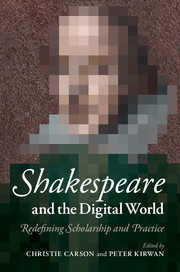Book contents
- Frontmatter
- Contents
- Notes on contributors
- Acknowledgements
- Shakespeare and the digital world
- Part I Defining current digital scholarship and practice
- Part II Defining current digital scholarship and practice
- Half-time: A pause for reflection
- Part III Redefining the boundaries and practices of Shakespeare studies online
- Part IV Redefining the boundaries and practices of Shakespeare studies online
- Index
Part I - Defining current digital scholarship and practice
Shakespeare research in the digital age
Published online by Cambridge University Press: 05 July 2014
- Frontmatter
- Contents
- Notes on contributors
- Acknowledgements
- Shakespeare and the digital world
- Part I Defining current digital scholarship and practice
- Part II Defining current digital scholarship and practice
- Half-time: A pause for reflection
- Part III Redefining the boundaries and practices of Shakespeare studies online
- Part IV Redefining the boundaries and practices of Shakespeare studies online
- Index
Summary
Katherine Rowe, in her introduction to a special issue of Shakespeare Quarterly on ‘Shakespeare and New Media’, writes: ‘Older forms and values provide a vital intellectual framework for the way we use newer media, shaping the needs we bring to the new tools and the opportunities we find in them’ (2010: iii). This simple statement makes clear that what we bring to digital media helps to determine what we find in these new ways of working. Research in this environment is both enhanced and extended by the fact that large databases of information are now available at our fingertips and fragile texts are accessible at the click of a button. However, access to information is not the same as knowledge and the opportunities afforded by the new environment raise as many questions and problems as they answer. The chapters in this section look at the ‘intellectual framework’ of research as well as the day-to-day processes involved in that activity. Can research today be said to be the same activity as it was twenty years ago when finding and analysing texts and/or performance was considered the primary aim of Shakespeare scholarship?
The first step in ‘Defining current digital scholarship and practice’ is to map out a history for this area of activity as it relates to ‘older forms and values’. This is achieved in the first two chapters of this section by John Lavagnino, who makes clear the relationship between the wider field of digital humanities and Shakespeare scholarship, and Bruce R. Smith, who looks in characteristically astute detail at the phenomenological shift that has taken place in terms of the physical activity of ‘doing research’. These two scholars, both in form and in content, reassess the way we do what we do as well as why we do it. Returning to the first principles of research, first looking back for historical precedents and then looking straight down at the desk and the body of the researcher, begins the process of this volume, which is to stop and reconsider the changes taking place in our world, assuming that we have the power to have an impact on those changes if only we take the time to reflect critically.
- Type
- Chapter
- Information
- Shakespeare and the Digital WorldRedefining Scholarship and Practice, pp. 9 - 13Publisher: Cambridge University PressPrint publication year: 2014



